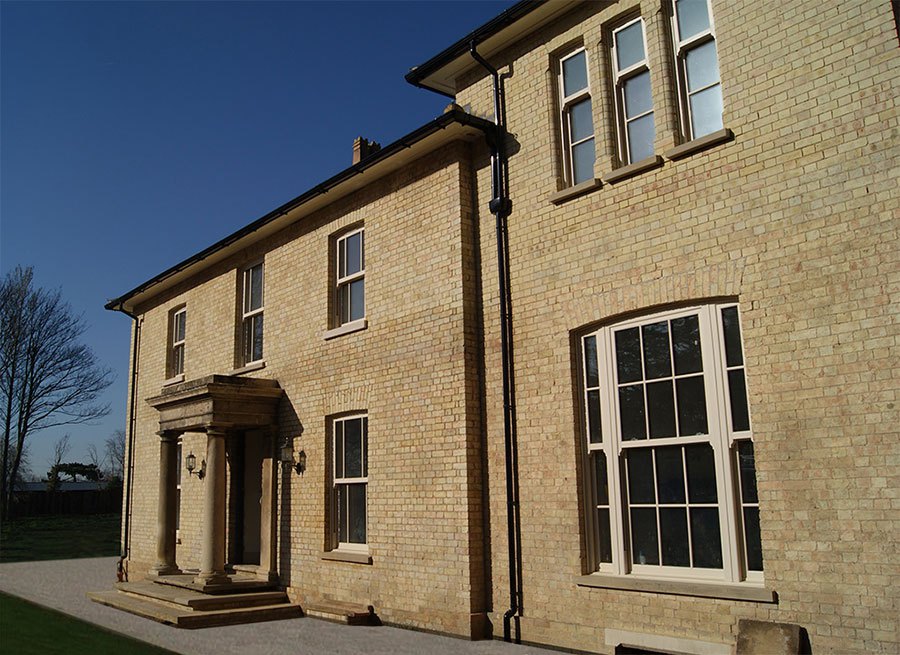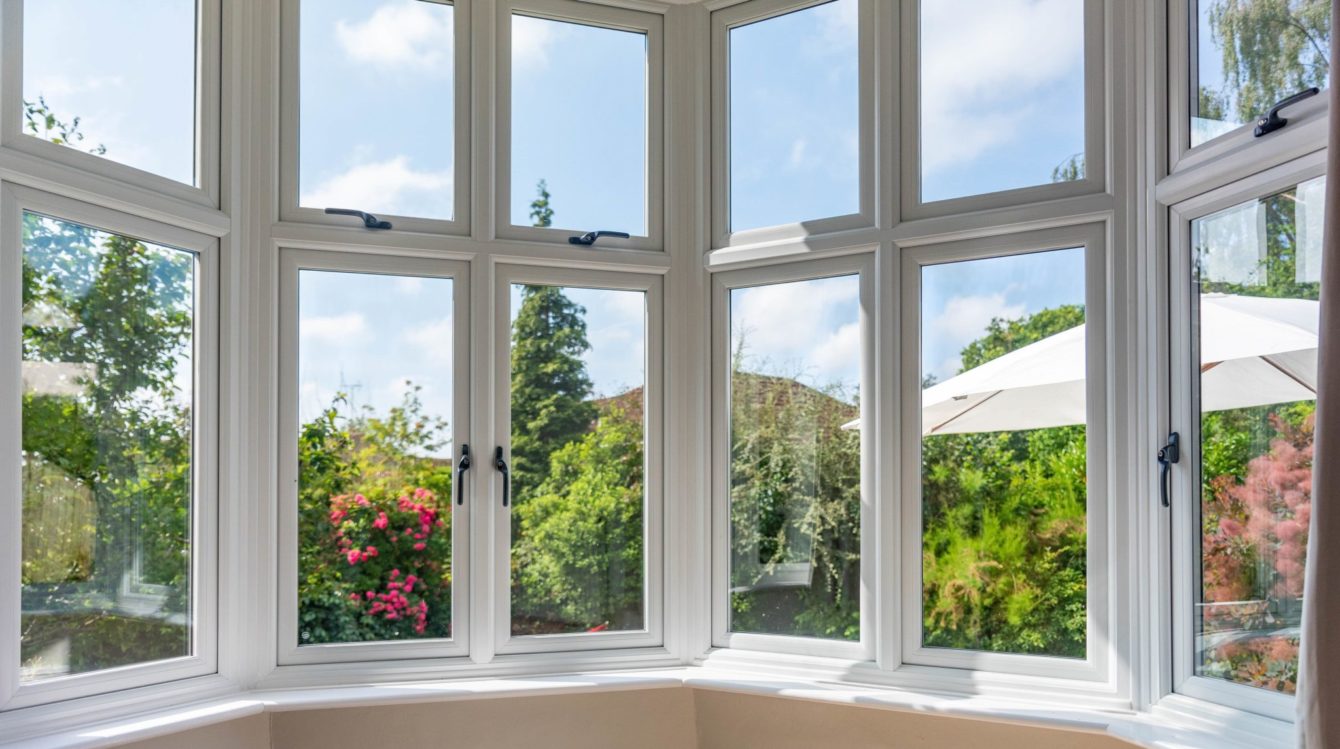Our guide to replacing windows in period homes
If you’re lucky enough to live in a period home, you’ll be well aware of their charm and the ‘quirks’ that are often part of the experience.
Period windows can be beautiful, full of character and very much the essence of the property.
However, when in a poor state of repair, period windows can be draughty, inefficient from an energy perspective, and provide a low level of security. Replacing them requires careful planning and particular considerations.
Here, we guide you through the important aspects to think about from style to planning permission, so that you can be confident your replacement windows will be a positive part of your home’s history.

Sensitive style choice
Choosing the style for replacement period windows often starts with finding the best approach to emulating the existing windows.
Modern replacement windows, whether made of timber, PVCu or aluminium, do this very effectively from an aesthetic perspective – and their technological construction brings the added benefits of thermal efficiency and security.
Each window style has particular considerations that are worth thinking about:
Sash windows
If your aim is to replicate as closely as possible your existing sash windows, it’s important to understand the period detailing.
Colour and finish, proportion, glazing and method of opening are all aspects that can be tailored to ensure an exact match.
One of the key aesthetic elements of sash windows is the astragal bars, which are a standout feature and can be constructed to suit the particular period, whether that be Edwardian, Georgian or Victorian.

Bay windows
With bay windows, proportion is critical. It’s important to ensure that replacement windows are identical to the existing design for the integrity of the architecture, and ‘balance’ of the property’s aesthetic.
For this reason, custom made bay windows are the safest choice.
Read about a project where we transformed double elevation bay windows in Haywards Heath.

Aluminium casement windows
Aluminium casement windows offer a contemporary option for period properties that can both complement and enhance heritage style, whilst contributing all the energy-saving benefits.

Read more about the project above, where we replaced crittal windows with modern aluminium alternatives at a stunning Maresfield home.
If you would like to read more about choosing the right windows for period properties, our useful guide will take you through all the design considerations.
Understanding what you can and can’t do
Where you live and any particular stipulations that might be in place can influence development of and changes to your property. There may be specific checks, permissions and procedures that you need to address before you go ahead with any improvements.
Conservation areas
Introduced in the 1960s, conservation areas oblige local authorities to preserve or enhance an area’s special character.
For properties located in conservation areas, permission for any aesthetic and functional changes to a property lies with the local Conservation Officer. They will advise whether a Planning Application is required through ‘pre-application advice’.
A Building Notice application may be required – this is a written notice that you intend to carry out building work.
If you are permitted to replace your windows with double glazed alternatives, a FENSA certified company can self-certify their own work, and a Building Notice application will not be necessary.
Advice as to whether your home is in a conservation area can be found at gov.uk by entering your postcode.
Many buildings in conservation areas retain ‘permitted development’ rights, which enable improvements to be made without the need for planning permission. In the case of replacement windows, there may be a stipulation to replace them so that they are in keeping with the character of the property.
Article 4 Direction
If your property is subject to an ‘Article 4 Direction’, the work that can be carried out without the need for planning permission is limited by the Council, effectively overriding permitted development rights.
This aspect will be checked through pre-application advice from the Conservation Officer. A likely outcome could be that a ‘like for like’ replacement of your windows will be specified.

Listed buildings
Historic England holds The National Heritage List for England. A listed building is an individual building of ‘architectural or historical interest’.
A building is designated as listed based on its own merits, rather than whether it is in a conservation area – not all properties in conservation areas are listed.
Listed Buildings are either termed as Grade I, Grade II* or Grade II:
- Grade I: buildings of exceptional interest.
- Grade II*: particularly important buildings of more than special interest.
- Grade II: buildings that are of special interest. This is the most likely grade for a home owner.

Listed building consent is usually required to replace windows in listed properties. A like-for-like replacement is often the requested outcome.
For listed buildings, it is highly likely that timber would be the required material for your replacement windows, rather than more modern materials. Timber windows will authentically retain the original aesthetic design.
Double glazing in period windows
One of the main improvements when upgrading period windows is to include double glazing. The benefits of increased thermal efficiency, energy saving, noise and draught reduction are clear.
Modern double glazed units have a slimmer profile so that the panes are subtle and in-keeping with the character of the building. Double glazing is available in PVCu, timber and aluminium windows, so there is a wealth of choice for the right style and material for the individual property.

Security
Another important aspect of replacing windows is improving security. Original windows are often not the most secure.
Modern alternatives offer locking systems tailored to the style of window. For example, contemporary sash windows feature high security espagnolette locking systems.
All security features should be in accordance with British Standards (BS7950).
Building regulations
Building regulations stipulate that specific requirements for replacement windows are met – and these can differ for period properties, where there needs to be a sympathetic and pragmatic approach.
Your windows installation company should be fully up to speed with all requirements, which can include:
- ensuring appropirate ventilation through trickle vents
- the installation of safety glass where needed
- management of the amount of heat that passes throught the glass or U-Value.
A FENSA certified company is required to understand building regulations in order to install windows in your home that meet them.
They will be able to advise on all aspects of design and installation to ensure compliance with regulations. They can then self-certify the work and provide the relevant certificate.
Expertise you can rely on
We have worked with customers to renovate all types of period properties, whether listed or in conservation areas. We have the experience to guide you through all the considerations and any permissions you may need.
If you would like to discuss your specific requirements for replacement windows, please call us on 01444 45 71 45.